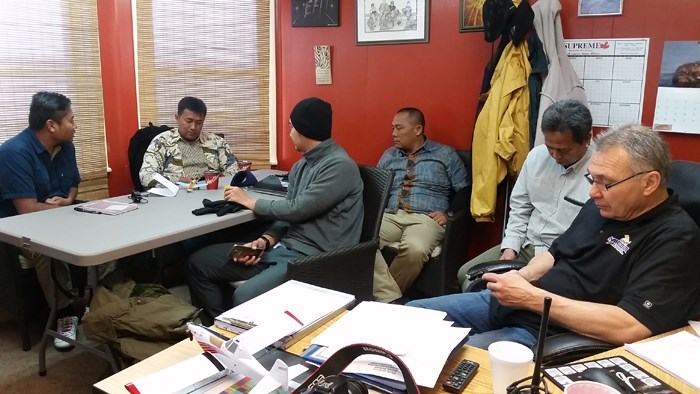When the Indonesian aviation company PT Elang, Nusantara Air decided it wanted to bring its aerial fertilizing program in-house, it turned to Nuryanta veteran pilo Darmo Soewito to oversee a pilot project, no pun intented, to train Indonesians for the job. Soewito turned to Yorkton’s Miccar Aerial.
PT Elang does aerial fertilization of around 400,000 hectares of palm plantations on the islands of Borneo, Sumatra and Papua. It currently brings in pilots from out of country. Soewito, a former commercial pilot with more than 20,000 hours of flight experiences with Indonesian airlines Merpati, Geruda and Lion Air, as well as, Tunisia’s national airline Tunisair, did his research.
“We are looking [to have] well-trained pilots, that is why we are here,” Soewito said. “I already inquired before I came here about the training for ag pilots, all over the world.”
Good Spirit and Miccar came to his attention through a New Zealand pilot whom Devan Yaholnitsky, son of Miccar co-owner Michael Yaholnitsky, had previously trained.
Soewito and Devan spent more than a year corresponding back and forth over email to make sure the program was right for his needs.
“Our program and syllabus, I think, fit the requirements of the company, as well as, our training aircraft is pretty much identical to what they’ll actually be flying,” Devan said. “We created a training syllabus to meet their specific requirements.”
The course is basically a hybrid of a basic program on the type of aircraft with advanced training on specific agricultural maneouvres, Devan explained. It is divided into four phases, an introduction to tailwheel and agricultural flying; applying the theory in a small Citabria aircraft (10 hours); increasing payloads and emergency procedures in a Pawnee PA 25 (15 hours); and, finally, applying everything to the faster, more complex, turbine-powered Thrush 510P.
Specific agricultural skills they will be learning include low flying, flying with a heavily-loaded aircraft and taking off and landing on poor, unimproved airstrips. The runways in Indonesia they will be dealing with are literally dirt strips cut out of the jungle, Devan explained, hence the need for the tailwheel endorsement and they could be doing up to eight to 10 takeoffs and landings per hour.
The four men being trained are already qualified as commercial pilots and had to complete English language proficiency.
“They’ve all worked very hard and they’ve been selected out of a huge group of people,” Michael Yaholnitsky said.
Ultimately, the four will have to gain the requisite practical experience at home, but Devan said the outcome of their time in Canada will be qualifying on a complex agricultural plane with safety as the primary focus.
“Upon completion, these guys will be safe and competent on the aircraft and have a basic understanding of agricultural aviation and procedures,” he said. “It’s difficult in 35 hours to get them to be as proficient as a pilot at, say, 50 or 100 hours, but they’ll leave here with the basic understanding and have the ability to operate the aircraft safely.”
Miccar Aerial is a family business owned and operated by Michael and Carol Yaholnitsky. In addition to pilot training, it provides aerial crop dusting services. The company’s six planes are equipped to provide both liquid and dry fertilizer. State of the
art GPS systems allows Miccar to store field data for all its customers.
The Yaholnitskys also own and operate Good Spirit Air, which provides scheduled passenger service between Yorkton and Flin Flon three days a week, as well as, charter services anywhere in continental North America.



